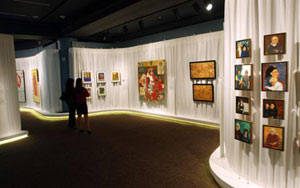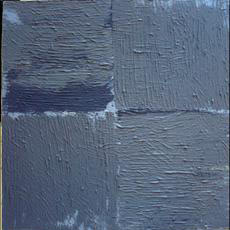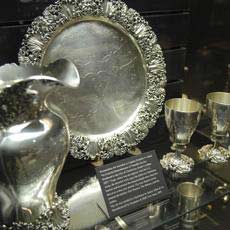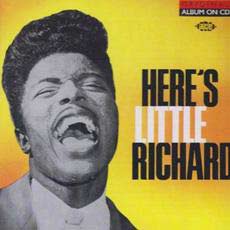|
 A view of the "Revealing Culture" exhibit at the Smithsonian Institution’s S. Dillon Ripley Center in Washington. |
(MUSIC)
I'm Mario Ritter.
Today we answer a listener question about the oldest museum in the United States.
And listen to some of the latest songs added to the National Recording Registry.
But first, we visit a special art exhibit in Washington, D.C.
(MUSIC)
"Revealing Culture"
MARIO RITTER: VSA is an international organization that supports the arts for people with disabilities. Last month, the group's festival brought artists from around the world to Washington to celebrate art and art education. VSA also organized an art exhibit called "Revealing Culture," now on view at the Smithsonian Institution's S. Dillon Ripley Center. Jim Tedder tells us more.
JIM TEDDER: VSA hired the well-known building designer Michael Graves to design the "Revealing Culture" exhibit space. In 2003, an infection left him unable to move parts of his body. Mr. Graves must now use a wheelchair to move around. So he knows the problems people with disabilities face in public spaces.
This gave him a special point of view when creating this exhibit. He made sure there was space for wheelchairs to move. He also asked that the art be hung lower so people in wheelchairs can see it.
The 54 artists in the "Revealing Culture" exhibit make works that express their experience of the world. For example, the New York artist Busser Howell is blind. The surface of his painting, "Blue Square," is covered in extremely thick blue paint which he applied using his fingers. Next to the work is a smaller example of his painting. Visitors can touch it to feel the roughness and smoothness of the art.
|
 Busser Howell's painting "Blue Square" |
Janet Morrow was interested in the way people react to cakes, which people often eat to celebrate happy events such as birthdays. She decided to make cake sculptures that test people's reactions. One cake is made of medicine. Another is made of tobacco products. She says these sculptures comment on problems in society such as drug use and smoking.
"Revealing Culture" wants visitors to be mindful of their senses. The curator of the exhibit, Leanne Mella, notes that western cultures value sight over other senses. She says this exhibit helps explore other ways of experiencing art and the world we live in.
(MUSIC)
Museums in America
MARIO RITTER: Our question this week comes from Jelena, a student from Bosnia, who is visiting the United States for five months. She wants to know about the oldest museum in the United States.
We hope you enjoy your stay in the United States, Jelena. If possible, you should try to visit Washington, D.C. and see the Smithsonian Institution. It is not just one museum, but many different buildings. Most of them are around the National Mall, near the Voice of America building. At the Smithsonian museums, you will find everything from huge dinosaur bones to the Hope diamond, one of the largest in the world. If you want to learn about American history, the Smithsonian is the place to go.
Thousands of objects on display show and tell about our story. To see it all would take weeks.
The Smithsonian was started in 1846 while James Polk was President. Many people believe that the Smithsonian is America's oldest museum. But it is not.
To find this country's oldest museum, you have to travel to South Carolina. The Charleston Museum calls itself America's first museum. It was started in 1773 -- even before our country became the United States.
|
 Objects from the Charleston Museum's silver collection |
There are interesting museums in all the largest American cities. The American Association of Museums says there are about 17,500 museums in the United States. Many small towns also have things on display that help tell the story of the American people and the history of our country.
(MUSIC)
National Recording Registry
MARIO RITTER: The Library of Congress has announced the latest 25 recordings to be added to the National Recording Registry. Recordings selected for the registry must be at least ten years old. And they must be considered "culturally, historically or aesthetically significant." Shirley Griffith tells us about them.
SHIRLEY GRIFFITH: This year's additions to the eighth yearly National Recording Registry include jazz and rock songs, rap music and a classic motion picture theme song.
(MUSIC)
That was Jiminy Cricket singing "When You Wish Upon a Star" from Walt Disney's 1940 animated movie "Pinocchio." Cliff Edwards was the voice of Jiminy Cricket.

The Librarian of Congress, James Billington, said: "The latest list of selections showcases the diverse beauty, humanity and artistry found in the American soundscape."
(MUSIC)
Rhythm and blues pioneer Little Richard earned a spot on the list with his first single, one of the early rock and roll songs. He recorded "Tutti Frutti" in 1955. It was the first of more than 12 top hits for Little Richard over the next three years.
These are some of the other recordings added to the National Recording Registry: A 1923 recording of "Canal Street Blues" by King Oliver's Creole Jazz Band. A United States Marine Corps combat field recording from the Second Battle of Guam. A 1949 spoken-word narration of the popular children's story "The Little Engine that Could." The original Broadway cast recording of "Gypsy" from 1959. Songs by Loretta Lynn, Willie Nelson, Patti Smith and R.E.M. And this song, "Up on Cripple Creek," one of many hits by The Band from 1969.
(MUSIC)
This year is the third time that a rap or hip-hop performance has been chosen for the National Recording Registry. It is "Dear Mama" by the late Tupac Shakur. The National Recording Preservation Board says the song honors both Tupac's mother and mothers everywhere.
(MUSIC)
MARIO RITTER: I'm Mario Ritter. Our program was written by Shelley Gollust, Jim Tedder and Dana Demange, who was also the producer.
You can find transcripts, MP3s and podcasts of our shows at voaspecialenglish.com. If you have a question about American life, send an e-mail to mosaic@voanews.com. We might answer it on this show. Please remember to tell us your name and where you live.
Join us again next week for AMERICAN MOSAIC, VOA's radio magazine in Special English.
Happy 234th birthday to the U-S of A
So this Lakers fan walks into a bar full of Boston fans ...
The story of 'Moby Dick' moves from the page to the stage
Speeches that sent off the graduates of 2010
(來源:VOA 編輯:陳丹妮)
